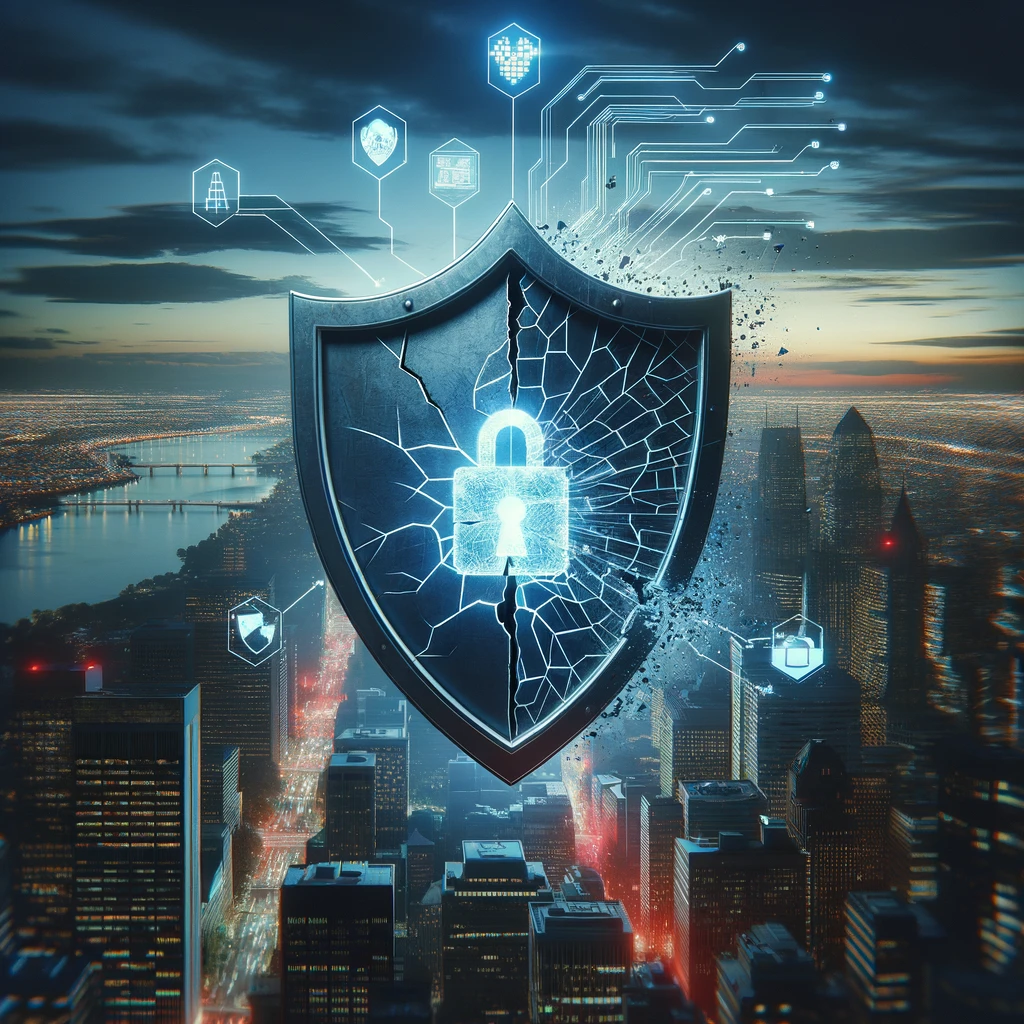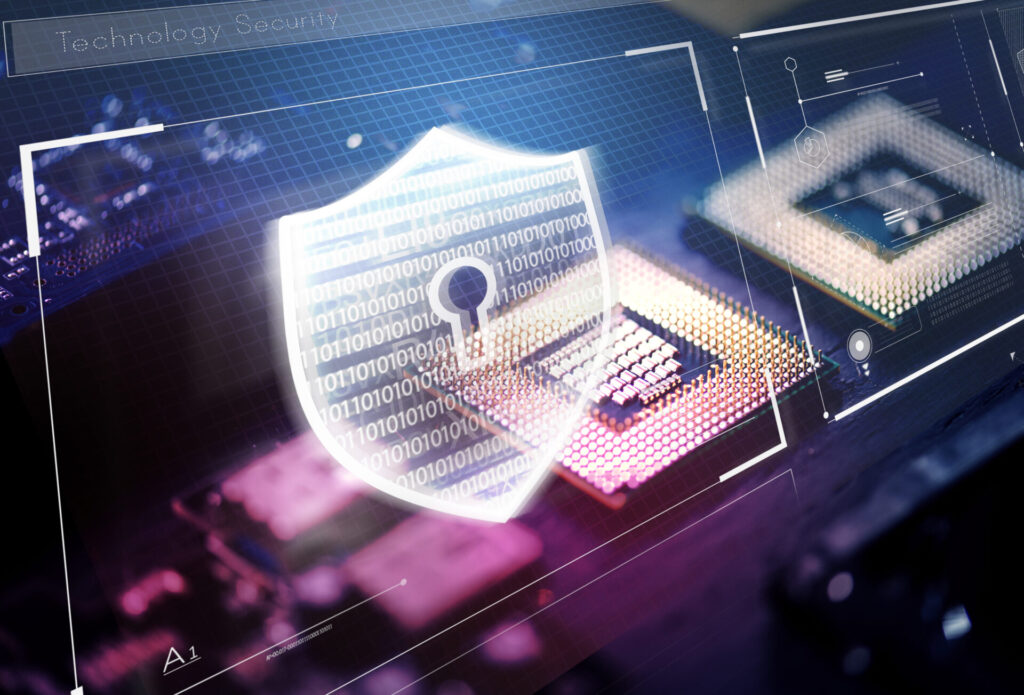Why Your IT Department is Putting You at Risk and How to Fix it
Simple Plan IT
February 6, 2025

The struggle that businesses face with cybersecurity can often be attributed to their reliance on IT departments to manage this critical aspect of their operations. It’s important to note that this is not a criticism of IT departments; rather, it’s an acknowledgement of the reality that, with the convergence of various technologies and responsibilities on the network, IT departments are tasked with an overwhelming number of duties. As a result, it becomes nearly impossible for them to effectively manage cybersecurity simultaneously. In this article, we will delve into the reasons why relying solely on an IT department for cybersecurity can leave businesses vulnerable and explore the benefits of having a dedicated cybersecurity team or Security Operations Center (SOC) to address these challenges.
The Overwhelming Burden on IT Departments
Your IT department is already swamped with a never-ending to-do list. It was a lot to manage back in the day when all they had to worry about were things like hardware and software maintenance, troubleshooting, and network management. Today’s office networks are more complex than ever with countless devices, printers, phone systems, cloud services, Bring Your Own Device (BYOD), and the expanded remote access requirements. Add in the fact that some businesses are incorporating Internet of Things (IoT) devices, such as smart thermostats, security cameras, and even coffee machines, and you can start to see the full picture of what your IT department is expected to manage.
Piling cybersecurity on top of their already extensive to-do list is a recipe for disaster. Spreading resources too thin can lead to missed vulnerabilities, outdated security measures, and insufficient monitoring – all of which leave your business exposed to cyber threats.
Specialized Skills: Why IT Departments Can't Do It All
IT professionals have diverse technical skills, which are crucial for keeping your systems up and running. One of the primary challenges generalized IT departments face is the sheer breadth of their responsibilities, which leaves them with limited time and resources to focus on the constantly changing cybersecurity landscape. When you factor in the constant demands of hardware and software maintenance, troubleshooting, and network management, it becomes clear to see how impossible it is for them to acquire the specialized cybersecurity skills needed to keep your business safe.
Another issue is the fast-paced nature of the cybersecurity field. Threats are continuously evolving, with new vulnerabilities and attack methods being discovered every day. This requires constant learning, adaptation, and specialization. Expecting IT professionals to stay on top of these developments while managing their day-to-day responsibilities is unrealistic and places undue strain on your IT team.

Active Monitoring: The Challenge for IT Departments
Active, real-time monitoring is crucial for maintaining a strong security posture. It enables businesses to detect and respond to potential threats before they escalate into damaging incidents. By continuously scanning for vulnerabilities, analyzing network traffic, and investigating suspicious activities, organizations can stay one step ahead of cybercriminals and minimize the impact of cyberattacks.
However, if you’re relying on your IT department to protect your business against cyberattacks, then you’re leaving your network vulnerable. Once again, that’s not an attack or insult towards your IT department, it’s just that if you don’t have active, real-time visibility into what’s happening on the network, then it’s impossible to be proactive and stay ahead of evolving threats. The fact is, there’s a number of reasons that IT departments fall short in this area:
- Limited Resources and Time: Like we’ve already discussed, IT departments already juggle multiple responsibilities, such as hardware and software maintenance, troubleshooting, and network management. This leaves them with little time and resources to dedicate to continuous monitoring, which is essential when taking a proactive approach to cybersecurity.
- Inadequate Security Tools: While IT departments may have access to some security tools, the vast majority of them don’t possess the advanced and specialized tools required for real-time threat detection. Tools like a Security Information and Event Management (SIEM) system for example, give security teams the ability to rapidly identification and respond to evolving threats that haven’t been seen before.
- Lack of Specialized Expertise: Real-time monitoring and detection require a deep understanding of cyber threats and their evolving tactics. IT professionals, though skilled in various technical areas, just don’t have the specialized expertise needed to identify subtle signs of attacks and respond effectively.
Neglecting Proper Forensics: The Risk of Insurance Claims Denial
When disasters strike and the pressure is on, you can’t afford for your team to fumble the ball. You need to have clear plans that can be quickly executed to minimize damage and get your systems back on track as quickly as possible. Unfortunately, IT departments, with their primary focus on system uptime and functionality, might rush to restore services without addressing the root cause of the breach. This haste can leave your business vulnerable to further attacks if proper security measures aren’t taken to ensure that the virus or criminal access has been completely eradicated. It could also have significant financial consequences, particularly when it comes to cyber insurance claims.
Most cyber insurance policies require policy holders to take reasonable precautions to protect their digital assets and promptly address any vulnerabilities. Failing to conduct a comprehensive forensic analysis following a cyber incident may lead to the insurance company considering that the policyholder has not met these requirements. As a result, the insurer could potentially deny the claim based on non-compliance with the policy’s terms and conditions.
The other concern is that proper forensics is often necessary to accurately assess the extent of the damage caused by a cyberattack. You have to be able to report the overall impact of things such as data loss, business interruption, and reputational harm. Without a clear understanding of the attack’s impact, an insurance company may be unable to determine the appropriate compensation, further complicating the claims process and increasing the likelihood of claim denial or underpayment.

Compliance: The Never-Ending Juggling Act
In today’s complex regulatory landscape, compliance is not something businesses can afford to take lightly. Failure to adhere to industry-specific cybersecurity regulations can have devastating consequences, including hefty fines, legal repercussions, and lasting damage to your company’s reputation. For an already busy IT department, juggling their regular responsibilities and the ever-changing compliance rules can be a monumental challenge, often leading to stretched resources and the risk of non-compliance.
When your IT department is spread too thin, the likelihood of non-compliance increases significantly. This can result in a myriad of negative consequences for your business:
- Hefty Fines: Regulatory bodies impose substantial fines on companies that fail to comply with cybersecurity regulations. For example, a single HIPAA violation falling under the highest tier, Tier 4, where the organization is found to have exhibited “willful neglect” and failed to correct the violation, can result in a maximum fine of $50,000 per violation. Depending on the number of records affected and the duration of the violation, the total penalty can reach up to $1.5 million per calendar year for each provision of the HIPAA regulations that have been violated.
- Legal Repercussions: Non-compliance with industry-specific regulations can lead to legal actions against your company. Lengthy litigation processes can drain your resources and put your business operations at risk.
- Reputation Damage: When a company fails to comply with cybersecurity regulations, it risks tarnishing its reputation in the eyes of customers, partners, and stakeholders. This loss of trust can result in decreased sales, severed partnerships, and a damaged brand image that may take years to recover from.
- Loss of Business Opportunities: In some cases, non-compliance can lead to exclusion from certain markets or business opportunities. For instance, companies that don’t comply with government cybersecurity regulations may be barred from bidding on government contracts or participating in specific industry sectors.
- Operational Disruption: Non-compliance can also result in the disruption of your business operations due to investigations, audits, or even temporary shutdowns enforced by regulatory bodies. Such disruptions can have a significant impact on your revenue, workforce, and ability to serve your customers.

The Benefits of a Specialized Cybersecurity Team or SOC
Now that we’ve highlighted the risks of relying solely on an IT department, let’s explore how a dedicated cybersecurity team or SOC can address these issues head-on and keep your business safe from cyber threats.
- Streamlined Focus on Security: A dedicated cybersecurity team or SOC specializes in protecting your business from cyber threats. This focused approach means they are solely responsible for security, allowing your IT department to concentrate on their core responsibilities. The result is a more efficient allocation of resources, leading to better overall production and protection.
- Advanced Skill Set and Expertise: Cybersecurity specialists possess the necessary knowledge and expertise to tackle complex and evolving threats. They undergo continuous training to stay updated on the latest attack vectors, vulnerabilities, and mitigation strategies. This specialized skill set enables them to identify, prevent, and respond to threats faster and more effectively than your IT department would be able to.
- State-of-the-Art Tools and Monitoring: A dedicated cybersecurity team or SOC is equipped with advanced security tools and systems. These specialized tools give them the ability to monitor your network and systems 24/7 for any signs of intrusion or malicious activity. They also implement proactive measures like penetration testing, vulnerability assessments, and threat intelligence gathering to stay ahead of potential threats.
- Swift and Coordinated Incident Response: A dedicated cybersecurity team or SOC has established protocols and procedures for handling cyber incidents. They can quickly identify the scope of an attack, isolate affected systems, and initiate recovery efforts. By following a well-defined incident response plan, they minimize the impact of a breach and reduce downtime.
- Compliance and Regulatory Expertise: Cybersecurity specialists are well-versed in the various industry-specific regulations and compliance standards. They keep track of evolving requirements and ensure that your business stays compliant with the necessary security measures. By maintaining compliance, they help your company avoid fines, reputational damage, and potential legal issues.
Conclusion
While IT departments play a crucial role in maintaining the technical backbone of a business, they simply aren’t equipped to handle the ever-evolving cybersecurity landscape effectively. As we’ve seen, IT departments often struggle with balancing their existing responsibilities and staying ahead of emerging cyber threats. Relying solely on IT for your company’s cybersecurity can lead to dangerous security gaps, making your business vulnerable to cyberattacks and compliance issues.
To effectively address cybersecurity concerns, businesses must invest in a dedicated security team or a Security Operations Center (SOC). These specialized teams possess the expertise, tools, and resources necessary to monitor, detect, and respond to threats proactively. By prioritizing cybersecurity and enlisting a dedicated team, businesses can minimize risks, prevent breaches, and ensure long-term success in a world filled with cyber dangers. Don’t let your business become another cautionary tale—make the smart move today and give your cybersecurity the attention it deserves.
Secure Your Future
Why wait for a cyberattack to wreak havoc on your business? It’s time to take control of your company’s cybersecurity and ensure its long-term success. Our fully managed UEBA (User and Entity Behavior Analytics) solution simplifies cybersecurity for you, is easy to deploy and provides complete around-the-clock protection for your business. Experience the peace of mind that comes with knowing our team of experts will work hand-in-hand with your existing IT department to fortify your defenses.
Don’t let cyber threats dictate your business’s future. Schedule a discovery call with our experts today to learn how our cutting-edge UEBA solution can revolutionize your cybersecurity strategy.
Categories
Do You Need A Dedicated Cybersecurity Team?
Answering these 7 Questions will help you determine if your IT Team still has you covered, or if it’s time to bring in reinforcements.
Copyright © 2025 Simple Plan IT



